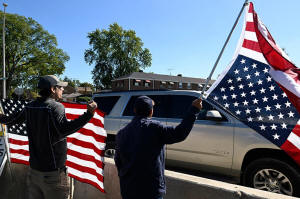Judge blocks National Guard deployment in Illinois for 2 weeks
[October 10, 2025]
By CHRISTINE FERNANDO and SUDHIN THANAWALA
A judge on Thursday blocked the deployment of National Guard troops in
the Chicago area for at least two weeks, finding no substantial evidence
that a “danger of rebellion” is brewing in Illinois during Trump's
immigration crackdown.
It’s a victory for Democratic officials who lead the state and city and
have traded insults with President Donald Trump about his drive to put
troops on the ground in major urban areas.
“The court confirmed what we all know: There is no credible evidence of
a rebellion in the state of Illinois. And no place for the National
Guard in the streets of American cities like Chicago,” Gov. JB Pritzker
said.
The judge said the administration violated the 10th Amendment, which
grants certain powers to states, and the 14th Amendment, which assures
due process and equal protection.
It wasn’t clear what the troops will do now, including a small number
outside a U.S. Immigration and Customs Enforcement building in
Broadview. Officials at U.S. Northern Command directed questions to the
Department of Defense, which declined to comment citing a policy that
the department doesn’t comment on ongoing litigation.
Guard was already in Illinois
The lawsuit was filed Monday by Chicago and Illinois as Guard members
from Texas and Illinois were on their way to a U.S. Army Reserve Center
in Elwood, southwest of Chicago. All 500 are under the U.S. Northern
Command and had been activated for 60 days.

Some slept in vans Wednesday night outside the Broadview building, near
Chicago, and emerged Thursday morning on patrol behind portable fences.
For weeks, the ICE site has been the site of occasional clashes between
protesters and federal agents.
Earlier Thursday, U.S. Justice Department lawyer Eric Hamilton said the
Guard’s mission would be to protect federal properties and government
law enforcers in the field, not “solving all of crime in Chicago.”
The nearly 150-year-old Posse Comitatus Act limits the military’s role
in enforcing domestic laws. But Trump has said he would be willing to
invoke the Insurrection Act, which allows a president to dispatch active
duty military in states that are unable to put down an insurrection or
are defying federal law.
“Chicago is seeing a brazen new form of hostility from rioters targeting
federal law enforcement,” Hamilton told the judge.
Perry, however, wasn’t swayed.
“I have seen no critical evidence that there is a danger of rebellion in
the state of Illinois,” she said hours later.
Order could be extended
The judge said the order would expire on Oct. 23 at 11:59 p.m. She set
an Oct. 22 hearing by telephone to determine if the order should be
extended for another 14 days.
Perry said the actions of the Department of Homeland Security are
largely rooted in Trump’s "animus toward Illinois elected officials.”
She expressed skepticism of the federal government’s characterization of
protests in Broadview.
“DHS’s narrative of events is simply unreliable,” said Perry, who was
appointed to the bench by President Joe Biden.
Chicago Mayor Brandon Johnson sat in a corner of the courtroom, which
overflowed into a room with video of the hearing.

[to top of second column]
|

Protestors yell at Immigration and Customs Enforcement agents
driving out of an immigration processing facility in Broadview,
Ill., Thursday, Oct. 9, 2025. (AP Photo/Paul Beaty)

The city and state have called the deployments unnecessary and
illegal.
“The president does not have the unfettered discretion to turn
America’s military against its own citizens when they exercise their
constitutional rights," Illinois Attorney General Kwame Raoul said.
Trump, meanwhile, has portrayed Chicago as a lawless “hellhole” of
crime despite statistics that show a significant drop in crime. He
said Pritzker and Johnson should be arrested for not protecting
agents during immigration sweeps. Pritzker's response: “Come and get
me.”
Court challenges elsewhere
Also Thursday, a federal appeals court heard arguments over whether
Trump had the authority to take control of 200 Oregon National Guard
troops. The president had planned to deploy them in Portland, where
there have been mostly small nightly protests outside an ICE
building.
A judge on Sunday granted a temporary restraining order blocking the
move. Trump had mobilized California troops for Portland just hours
after the judge first blocked him from using Oregon's Guard.
Two dozen other states with a Democratic attorney general or
governor signed a court filing in support of the legal challenge by
California and Oregon. Twenty others, led by Iowa, backed the Trump
administration.
Chicago’s federal court issued other decisions this week related to
immigration enforcement. In one, a judge said immigration agents
have repeatedly violated a 2022 consent decree outlining how ICE can
make so-called warrantless arrests. That decree requires ICE to show
documentation for each arrest it makes for people besides those
being targeted.
Immigrant advocacy groups believe hundreds of people arrested around
Chicago could qualify for reduced bond or have ankle monitors
removed.

Guard expected on ground in Memphis
Trump previously sent troops to Los Angeles and Washington. In
Tennessee, Memphis Mayor Paul Young said troops would begin
patrolling Friday. Republican Gov. Bill Lee supports the role.
Police Chief Cerelyn “CJ” Davis said she hoped the Guard would
direct traffic and have a presence in retail corridors, but not set
up checkpoints or make the city “feel like there is this
over-militarization in our communities.”
In a California case, a judge in September said the deployment was
illegal. By that point, just 300 of the thousands of troops sent
there remained and the judge did not order them to leave.
___
Associated Press writers Ed White in Detroit, Geoff Mulvihill in
Philadelphia, Adrian Sainz in Memphis, Tennessee, and Konstantin
Toropin in Washington, contributed to this report.
All contents © copyright 2025 Associated Press. All rights reserved |